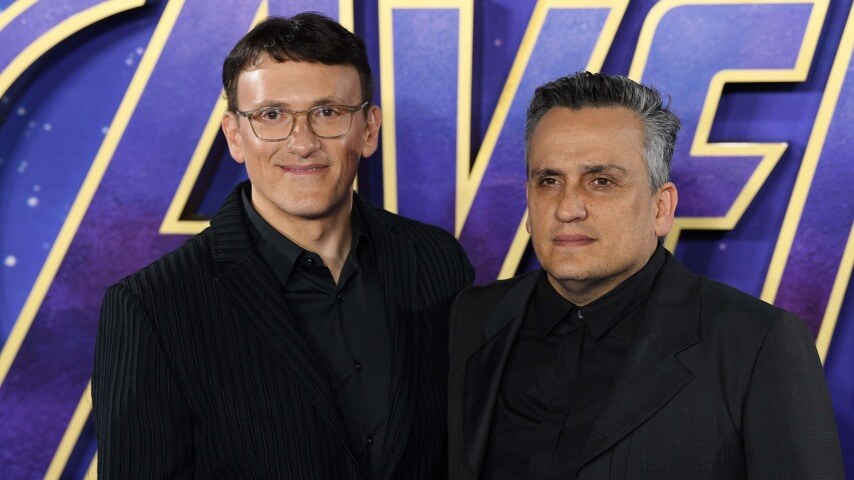Anthony and Joe Russo Photo: David Fisher
The post-Avengers: Endgame career of directors Joe and Anthony Russo has been marked by uninspiring output (Cherry, The Gray Man, Citadel) and relentless futurism. Their stated goal has been to create brand-new, sprawling IP franchises and to get ahead of the curve regarding technologies that are changing cinema, to control the tech before the tech controls artists. That includes artificial intelligence (they’re on the board of some AI companies), “three-dimensional projectors that don’t require glasses,” and, generally, the new ways that young people are consuming media, like TikTok. Change is coming “whether we like it or not,” say the Russos, so if you can’t beat ’em, join ’em.
Evolution is indeed inevitable, but are the Russos’ theories of cinema truly reflective of our current reality? In a conversation with GamesRadar over the weekend, the directors argued that the current struggles of Marvel and the superhero industrial complex aren’t due to so-called “superhero fatigue,” but more so indicative of how audiences are changing. “I think we’re in a transitional period and people don’t know quite yet how they’re going to receive stories moving forward, or what kinds of stories they’re going to want,” Joe told the outlet. “There’s a big generational divide about how you consume media. There’s a generation that’s used to appointment viewing and going to a theater on a certain date to see something, but it’s aging out. Meanwhile the new generation are ‘I want it now, I want to process it now’, then moving onto the next thing, which they process whilst doing two other things at the same time. You know, it’s a very different moment in time than it’s ever been. And so I think everyone, including Marvel, is experiencing the same thing, this transition. And I think that really is probably what’s at play more than anything else.”
Joe Russo is not the first to observe that we now “communicate through memes and headlines, with nobody reading past two sentences, so everything’s 100 characters or less—or 10-second videos on social media you swipe through.” Nor is he the first to note that “this next generation is looking for ways to tell their own stories that service their own sort of collective ADHD.” (Television titan Shonda Rhimes made a similar comment in a new Variety profile, out today.) The attention span issue is a growing concern, and the entertainment industry is already experimenting with adjustments.
But the Russos’ ruthlessness about cinema’s evolution doesn’t account for the ways that audiences today enjoy a traditional entertainment experience. Far from “aging out” of “appointment viewing,” the younger generations are reinventing it. Barbie and Oppenheimer didn’t become the biggest blockbusters of 2023 based on older generations alone. It was the younger generations that made “Barbenheimer” an event to dress up and go to the theater with a group of friends. Barbie, in particular, captured the imagination of young people, referencing cinematic classics without talking down to audiences. The movie went on to become one of the highest-grossing of all time. (For what it’s worth, the Russos’ Avengers movies are the second and sixth highest grossing movies ever, and Endgame was only five years ago.) The “event cinema” phenomenon was seen again with Taylor Swift’s Eras Tour concert film. “I’ve got four kids, so I can identify Gen Z’s habits pretty accurately. They don’t have the same emotional connection to watching things in a theater,” Joe Russo previously said. Yet 2023 is a case study for Gen Z appreciating the kind of communal experience that a theater can provide.
More evidence to the fact that the younger generation like actual movies is the popularity of Letterboxd, which currently has over 10 million users (five times as much as it did in 2019). Per Variety, “Half of the platform’s active users are under 35, and more than half of that group is between 16 and 24.” Rachel Lee of The Digital Fairy, a creative agency specializing in internet and youth culture, observed to GQ earlier this year, “Letterboxd has successfully tapped into the Gen Z phenomenon of ‘the memeification of everything.’” Making movies into social media is one smart, and clearly successful, way of making cinema engaging for the youth. Maybe many of those logged Letterboxd films were watched at home, with half the attention on phone screens. Nevertheless, it proves that people, particularly young people, care about feature-length films.
The Russos aren’t totally wrong. Audiences’ relationship to cinema is changing, and the entertainment industry will always chase down trends of the young audience. But they aren’t totally right, either. Pursuing new viewership trends isn’t always the right direction. (Remember Quibi?) Sometimes the change comes with delivery, as with streaming, and sometimes the change comes from marketing, which is present in the Barbenheimer and Letterboxd phenomenons. Young people don’t want “live-action Hercules, but make it TikTok.” Young people want movies that are fresh and exciting, that speak to them in a way that feels sincere and not strategized, that they can share with their friends and celebrate online. At the end of the day, the best way to sell a good story is still to make a good story. You don’t need AI to tell you that.

 Keep scrolling for more great stories.
Keep scrolling for more great stories.
